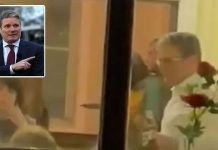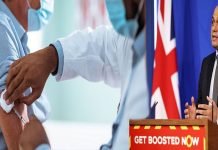MPs have backed a four-week lockdown in England to combat coronavirus, which will kick in at midnight.
Boris Johnson saw off a rebellion by 34 Tory MPs opposed to the move, with the support of Labour.
The government won the vote by 516 to 39, a majority of 477.
Under new rules, which MPs approved 516 votes to 38 on Wednesday, people will be told to stay at home for four weeks, like during the first national lockdown earlier this year.
Boris Johnson said it would be a “medical and moral disaster” not to act to stem spiralling coronavirus rates when he announced the tough new measures on Saturday.
The prime minister told MPs a second lockdown was needed to “contain the surge” in Covid cases – but rebels warned it would wreck businesses and lives.
The Tory rebels included former leader Sir Iain Duncan Smith and Sir Graham Brady, chairman of the influential 1922 committee of backbenchers.
It comes as the government said a further 492 people had died within 28 days of testing positive for Covid-19. This brings the UK total to 47,742.
Dr Yvonne Doyle, medical director of Public Health England, said: “Sadly we know that the trend in deaths will continue to rise over the next few weeks. As the new measures come into place it will take some time for the impact to be seen.
“We have all made sacrifices and they have helped to save many lives. Let’s stick with it to keep our loved ones safe. The fewer people you see, the more you’ll help stop the spread.”
‘Failed strategy’

Sir Keir Starmer whipped the Labour Party to support the government.
During a three-hour debate, Conservative rebels – and several Labour MPs from the north-west of England – said England’s tiered system, brought in two weeks ago, had not been given a chance.
Mr Johnson’s predecessor as prime minister, Theresa May, said: “The evidence is, from Liverpool, that cases are falling.”
Mrs May was among 19 Conservatives to abstain, including six MPs from Scottish seats, who did not want to take part in the vote as it applied to England only.
She criticised Labour’s call for a short, “circuit breaker” lockdown as impractical – but accused Mr Johnson of choosing data to fit his coronavirus policies.
The lockdown decision was “to some extent based on the prediction of 4,000 deaths a day,” said the former PM, but that figure had already been proved “wrong”.
“For many people it looks as if the figures are chosen to support the policy, rather than the policy being based on the figures.
“We need these proper analyses. We need to know the details behind these models.”
Conservative MP Philip Davies, who voted against the government, said: “Nobody voting for this motion tonight is offering to sacrifice their own job in order to pursue this lockdown policy – of course not. They are just expecting millions of others in our country to sacrifice their jobs to pursue this policy.
“I never thought I would see the day a so-called Conservative minister would stand up and urge Parliament to further sacrifice our most basic of freedoms, collapse the economy and destroy jobs – all to pursue a failed strategy.”
Earlier at Prime Minister’s Questions, Sir Keir Starmer accused Mr Johnson of “ignoring” the advice of government scientists who called for a brief “circuit breaker” lockdown in September.
“Does the prime minister understand the human cost of his delay in acting?” he asked Mr Johnson.
The PM said it was “always right to pursue a local and a regional approach,” adding that it was “showing signs of working”.
Mr Johnson insisted the lockdown will expire automatically on 2 December and he hopes “very much” to “get this country going again” in the run up to Christmas.
“But that depends on us all doing our bit now to make sure that we get the R [rate] down.”
New lockdown restrictions in full
MPs have put England into a second national lockdown from midnight tonight. Here is what you can and can’t do under the new rules
You can leave your house to take exercise and buy necessities
People are advised to stay at home as much as possible – unless they have a reasonable excuse.
Exemptions to the rules include buying necessities for your household or someone vulnerable.
You can exercise outside as much as you like, either alone or with members of your own household.
There is a new rule allowing you to meet one friend or family member from another household in a public space to exercise.
This can only happen in an open space and there can only be two of you in total. Children under 5 don’t count towards the limit.
Schools can remain open
A big change from the last lockdown is that schools and universities can remain open
The Government and Labour have agreed that keeping children in the classroom is vital, after many spent months away from school.
Universities are also allowed to stay open, though many are doing the majority of teaching virtually already.
But schoolchildren need to wear masks in corridors

Secondary school pupils will be ordered to wear masks in corridors and communal areas from Thursday.
Government guidance for England make it mandatory for children over 11 and teachers to don face coverings when moving around inside school buildings.
But masks will not be required in classrooms for either teachers or pupils.
The new rules say: “In schools where pupils in year 7 and above are educated, face coverings should be worn by adults and pupils when moving around the premises, outside of classrooms, such as in corridors and communal areas where social distancing cannot easily be maintained.”
Secondary pupils should also wear face coverings when they travel on school buses or dedicated transport.
The move brings the country in line with the rules previously imposed in Tier 3 areas of high infection, and comes after calls for heads for greater consistency in the rules.
People who cannot do their jobs at home can continue to work
Workplaces can remain open under Covid-secure guidelines if necessary.
This means industries such as construction and manufacturing are allowed to continue operating.
People who can work from home are advised to do so during the four-week lockdown.
There are exemptions for childcare
Parents can still access some childcare if needed while they work or provide care for others.
Early years settings can remain open and some youth support can continue.
Children whose parents are separated can still travel between households.
And children under 13 can be cared for informally by friends or relatives if you establish an exclusive “childcare bubble”.
Holidays are banned and you should not travel out of your area
People should reduce the number of journeys they make and avoid travelling outside of their local area.
Holidays abroad are banned and you cannot go on holiday in England, including to a second home.
Overnight stays away from your home are banned except if you need to for work or education purposes.
Support Independent Journalism Today
Our unwavering dedication is to provide you with unbiased news, diverse perspectives, and insightful opinions. We're on a mission to ensure that those in positions of power are held accountable for their actions, but we can't do it alone. Labour Heartlands is primarily funded by me, Paul Knaggs, and by the generous contributions of readers like you. Your donations keep us going and help us uphold the principles of independent journalism. Join us in our quest for truth, transparency, and accountability – donate today and be a part of our mission!
Like everyone else, we're facing challenges, and we need your help to stay online and continue providing crucial journalism. Every contribution, no matter how small, goes a long way in helping us thrive. By becoming one of our donors, you become a vital part of our mission to uncover the truth and uphold the values of democracy.
While we maintain our independence from political affiliations, we stand united against corruption, injustice, and the erosion of free speech, truth, and democracy. We believe in the power of accurate information in a democracy, and we consider facts non-negotiable.
Your support, no matter the amount, can make a significant impact. Together, we can make a difference and continue our journey toward a more informed and just society.
Thank you for supporting Labour Heartlands











